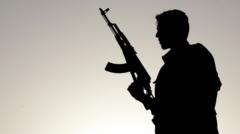The PKK's initiation of disarmament amid government support raises hopes for a peaceful resolution to a long-standing struggle.
**Kurdish PKK Takes Historic Step Towards Peace by Burning Weapons**

**Kurdish PKK Takes Historic Step Towards Peace by Burning Weapons**
A ceremony marking disarmament signifies a potential end to decades of conflict in Turkey.
Kurdish militants from the outlawed PKK (Kurdistan Workers' Party) have taken a groundbreaking step towards peace in Turkey by symbolically laying down their arms in a public ceremony. Approximately 30 fighters, both male and female, participated in this significant event by placing their weapons into a cauldron, marking the beginning of what is anticipated to be a summer-long disarmament process. The Turkish government responded positively, deeming it a vital milestone in their quest for a "terror-free Turkey." The conflict that has spanned over four decades has claimed around 40,000 lives, with the PKK being designated as a terrorist organization by Turkey, the United States, the European Union, and the United Kingdom.
The disarmament event took place in a cultural landmark situated about 30 miles north of Suleymaniyah, Iraq, where a range of political figures and journalists were in attendance. Fighters of the PKK, including notable leaders, placed their firearms in the cauldron as part of a gesture of goodwill. In their statement, the group referred to the act as a significant democratic gesture. Abdullah Ocalan, the PKK's long-imprisoned leader, emphasized this as a transition from armed conflict to a focus on democratic engagement, reiterating that it was time for the PKK to abandon its armed struggle.
This disarmament is not without historical context, as past attempts to broker peace have often fallen short. Initially founded on Marxist ideologies, the PKK originally sought independence but later shifted its demands towards greater autonomy for the Kurdish population in Turkey, who constitute roughly 20% of the country's demographic. Previous peace initiatives, notably those in 2013 and 2015, unraveled amid escalated violence and military actions against the PKK in various regions including Iraq and Syria.
Recent discussions indicating the possibility of a structural change to the Turkish state’s relationship with the PKK emerged from a nationalist leader's call for the group's disbandment, coupled with expressions from government officials that hinted at positive developments. As negotiations advance, there are signals that the Turkish government's willingness to engage in dialogue may increase.
The role of Abdullah Ocalan remains pivotal throughout this process. Although he remains a contentious figure, he maintains considerable influence among Kurdish supporters. A recent video message from Ocalan urged his followers to embrace political approaches over armed resistance, further reinforcing the call for peace.
Looking forward, the Turkish parliament is expected to establish a commission tasked with determining the next steps in this peace process. With the summer recess approaching, concrete actions may take some time. The outcome for Ocalan's imprisonment also remains uncertain, although conditions might be revisited as negotiations progress.
While the peace process holds promises for a more serene future in Turkey, potential changes to the constitution by President Erdogan’s administration could intertwine with this stability effort. Political maneuvers behind the scenes are crucial as Erdogan grapples with opposition pressures and the need for support from Kurdish political factions. The groundwork set by the disarmament initiative offers hope but also underscores the ongoing complexities entwined in achieving lasting peace.
The disarmament event took place in a cultural landmark situated about 30 miles north of Suleymaniyah, Iraq, where a range of political figures and journalists were in attendance. Fighters of the PKK, including notable leaders, placed their firearms in the cauldron as part of a gesture of goodwill. In their statement, the group referred to the act as a significant democratic gesture. Abdullah Ocalan, the PKK's long-imprisoned leader, emphasized this as a transition from armed conflict to a focus on democratic engagement, reiterating that it was time for the PKK to abandon its armed struggle.
This disarmament is not without historical context, as past attempts to broker peace have often fallen short. Initially founded on Marxist ideologies, the PKK originally sought independence but later shifted its demands towards greater autonomy for the Kurdish population in Turkey, who constitute roughly 20% of the country's demographic. Previous peace initiatives, notably those in 2013 and 2015, unraveled amid escalated violence and military actions against the PKK in various regions including Iraq and Syria.
Recent discussions indicating the possibility of a structural change to the Turkish state’s relationship with the PKK emerged from a nationalist leader's call for the group's disbandment, coupled with expressions from government officials that hinted at positive developments. As negotiations advance, there are signals that the Turkish government's willingness to engage in dialogue may increase.
The role of Abdullah Ocalan remains pivotal throughout this process. Although he remains a contentious figure, he maintains considerable influence among Kurdish supporters. A recent video message from Ocalan urged his followers to embrace political approaches over armed resistance, further reinforcing the call for peace.
Looking forward, the Turkish parliament is expected to establish a commission tasked with determining the next steps in this peace process. With the summer recess approaching, concrete actions may take some time. The outcome for Ocalan's imprisonment also remains uncertain, although conditions might be revisited as negotiations progress.
While the peace process holds promises for a more serene future in Turkey, potential changes to the constitution by President Erdogan’s administration could intertwine with this stability effort. Political maneuvers behind the scenes are crucial as Erdogan grapples with opposition pressures and the need for support from Kurdish political factions. The groundwork set by the disarmament initiative offers hope but also underscores the ongoing complexities entwined in achieving lasting peace.



















